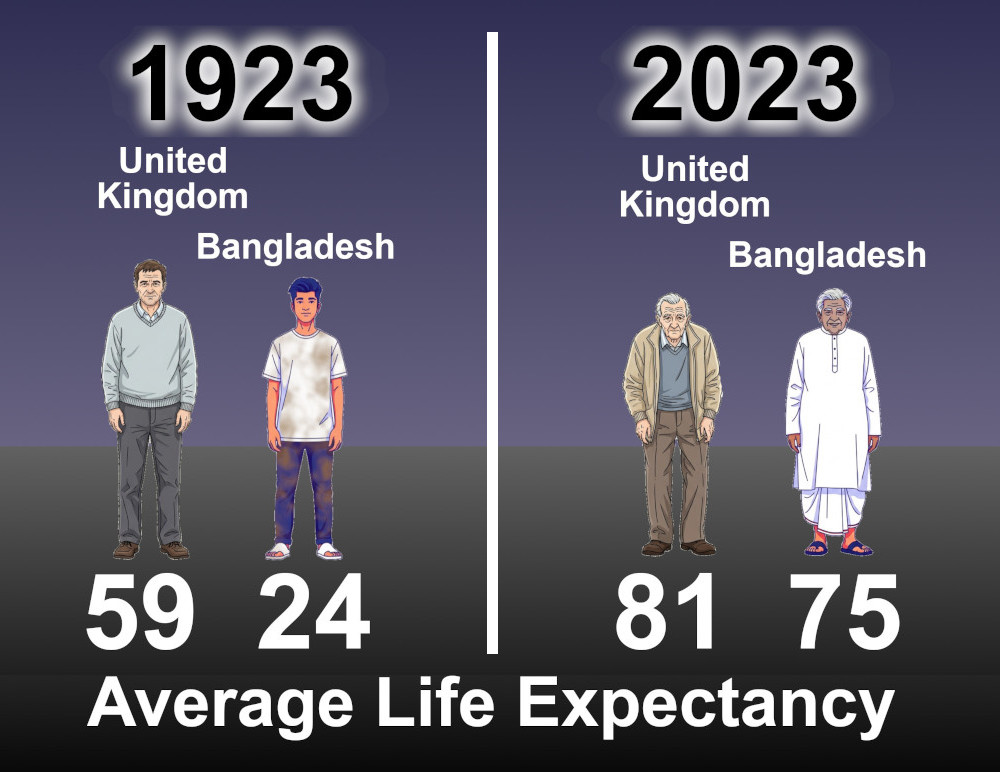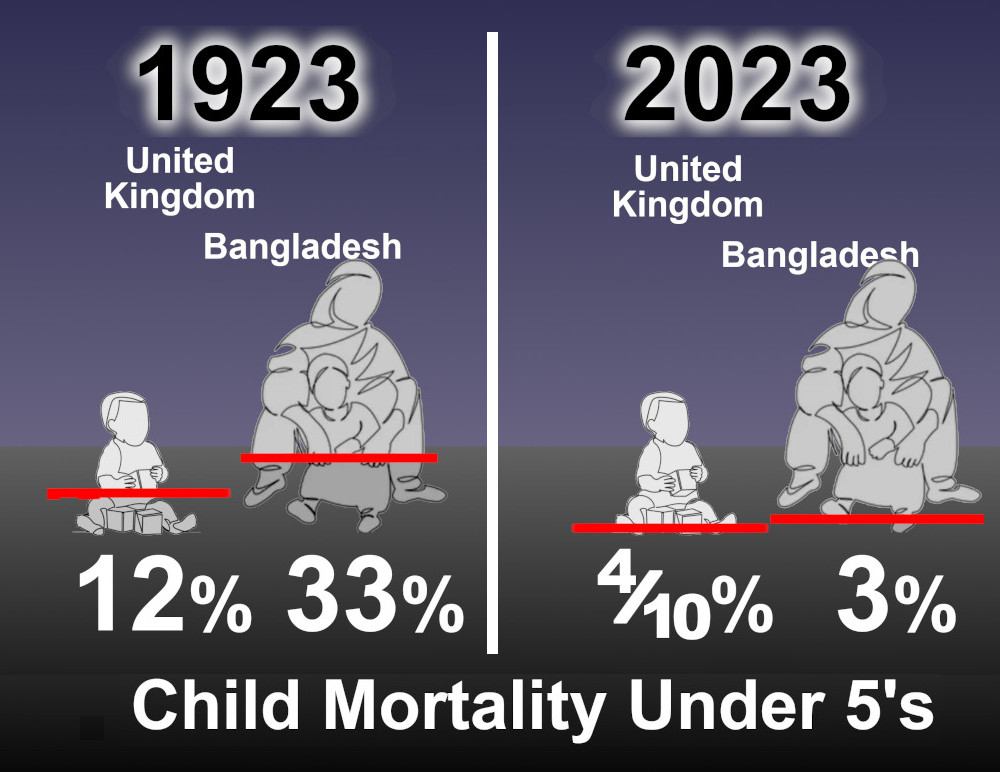


If you are like me, then you probably feel that you should be aware of what is happening in the wider world, but on the other hand, the news is so consistantly negative and depressing that you just want to turn it off.
How did Jesus dealt with the bad news and the negative situations that surrounded him? Because we are trying to follow him, aren't we?
It's all too easy to agonise over why did this happen, or why this man have the power to make those decisions, or how can that woman be allowed to behave this way... and on and on. And we can get so tangled up with why, why, why that we end up no closer to understanding and too tired to do anything practical.
But Jesus' teaching addresses the widespread suffering in the world not with a philosophical treatise, but with a distinctive combination of attitudes and actions, each of them essential. But before we get to that, there is some ground to clear.
It may surprise you to know that this is a long way from the truth! Rather the world is getting far far better.
It does not seem like that when we have a war in Ukraine, killing around half a million, and over a million wounded with no end in sight. And another war in Israel, killing around 65 thousand, and wounding maybe 150 thousand more, now escalating to Yemen and Iran. We have over 50 thousand killed and 11 million displaced by ongoing war in Sudan, and wars killing tens of thousands, and displacing hundreds of thousands in DRC, Yemen, Syria, Myanmar, Nigeria, Haiti, Afghanistan, etc, etc, etc.
And the United Kingdom has an arms industry supplying the defenders in Ukraine, and supplying those in Israel run by a government that includes alleged war criminals, and committing what will almost certainly be deemed as genocide once the slaughter is done. All in the name of "defence". And our government proudly claims we are the world's second largest exporter of "defence equipment".
To make matters worse, we have the world's no. 1 superpower drifting into authoritarianism, we could go on, and on. Our responsible awareness of what is happening can very quickly drag us into a hopeless despair. What can we do? Turn our eyes away? Hunker down into the small narrow familiar? No. That is not the way of following our Lord.
He says,
Let me show you how that is happening. Instead of closing our eyes, we should open them to a wider view of the world.
A comprehensive analysis indicates that around 85% of the world's population is experiencing a better quality of life than 100 years ago.
How about this - today the poorest 50% of people in the world have a better quality of life than did the richest 20% 100 years ago!
So I have chosen just three things to measure, and two countries to consider.



Astonishing isn't it? That's because we usually only see bad news, because bad news sells.
So the world really is getting radically better as each decade passes.
How is this happening? These improvements are down to medical researchers, epidemiologists, scientists, doctors, nurses, midwives, sanitation engineers, infrastructure engineers, educators, agricultural scientists, policy makers, health ministers, NGOs, data scientists, human rights advocates, social reformers, microfinance innovators, technology innovators.
So how can we, like those people, become part of the solution. Let's look at how Jesus taught and lived among people suffering invasion, dispossession and a third world lifestyle.
We have previously thought about that day when Jesus preached to the crowd on the hillside - the Sermon on the Mount. The common view of those listening was that if people suffered then they were to blame. Didn't God's contract in Deuteronomy 28 tell them that? Set terms and conditions.
The first twelve verses detailed clearly how you would be rewarded if you behaved well. And then the rest of the contract - fifty-five verses - spelled out God's punishment of chilling curses for bad behaviour.
Jesus starts to talk to his disciples sat around him. But before long, the crowd start to gather round and so perhaps he has to stand up and speak louder because they all want to hear. By the time he gets to the end, maybe a couple of hours later, there is a mass of people listening.
They are not surprised that he begins with ten verses of blessings. But they are subtly different to the blessings they have been taught from Deuteronomy 28. The poor are not after all, evidently disobedient to God, but are blessed. The rich are not evidently being rewarded by God, but specifically will struggle to get into God's kingdom.
Okay, they think, that's a bit weird. Because they have been taught to judge people's godliness by whether their fields are blessed, their homes are secure, by whether they are wealthy and healthy. So it is a shock to hear Jesus contradicting that health and wealth kind of teaching, by saying that it is the poor and the meek and the victimised that are blessed by God! "And by the way," says Jesus, "don't judge people at all!" But okay, they let the 'Beatitudes' pass as Jesus carries on teaching.
But the sermon doesn't continue with a whole set of detailed cursings inflicted by a jealous God. Instead he says they need to love their enemies, bless those who curse them, always do good to others, not punish those who do bad things to them, not even to think about it, to love not hate, to be faithful and not even entertain thoughts that make you long for what belongs to someone else. On and on it goes. And if they do that, he says...
Then they will be like Father in heaven!
What? Father in heaven is like that?
Yes, Jesus confirms it, and then he directly contradicts this transactional 'you-do-this, I'll-do-that' contractual arrangement defined in Deuteronomy. "God," he says, "is always impartially blessing. He causes his sun to rise on the evil and the good, and sends rain on the righteous and the unrighteous."
He has not simply told them how to live, he has redefined the character of God.
And he has unequivocally stated that an individual's suffering is not as a result of their own sin. Stop judging them. Stop blaming them. John 9
Jesus replies when asked about someone evidently in constant pain...
Later he is discussing in Luke 13 some people who died when a tower collapsed on them. He says,
But many people, both Christians and non-Christians still do not believe this. Because conveniently, if it is the sufferer's own fault, then we have no need to alleviate suffering.
Maybe you're thinking about the one verse in John 5 where Jesus explicitly links suffering to sin. By the pool of Bethesda, he says to a man he has just healed,
But divine punishment is never stated here. And given the weight of the entirety of Jesus teaching, perhaps it is far more likely that Jesus is referring to the problem of unhealthy living, or a sexually transmitted disease, or an addiction rather than immorality.
And now let me surprise you! All your life you have thought you understood what the New Testament says about sin. Well, 98% of the time sin is mentioned, the Greek word is hamartia. You will be astonished to know that hamartia does not mean immorality. No! It means 'missing the mark' or 'falling short of the goal'. Perhaps you recall Paul's words:
Even more reason why we should consider the possibility that the Bethesda pool man had behaved in a way that directly led to his physical suffering.
So the key takeaway here is that suffering is never the result of God punishing personal immorality. Jesus dismantles those simplistic ideas. Father in heaven does not work that way. And in fact what Jesus teaches accords with our experience doesn't it?
If I always overeat and never take exercise, then my hips and knees will give me plenty of suffering. If I become addicted to alcohol or tobacco then my health will suffer. These are not moral statements, simply cause and effect. Sometimes it involves immorality, but the cause and effect still applies. So if I have profligate unprotected sex, then I may end up with a sexually transmitted disease.
I can of course suffer from other people's bad behaviour! I can swim in polluted water, I can eat food produced or prepared with little regard for my health, I can go hungry because someone stole my food, I can lose a limb because someone makes a profit from making anti-personnel mines.
There is one place where Jesus hints at the root cause of suffering in the world.
You can find the story in Matthew 13:24-30 It's about a farmer who plants good seed in hope of a good crop, and how at night an enemy seeks to spoil the crop by planting weeds. The farmer decides the best course of action is to allow the wheat and the weeds to grow together, and separate them at harvest time, rather than while they are still actively growing. That is the way to minimise the damage.
So, don't blame the victim!
Jesus does not deny the reality of suffering—he acknowledges it, weeps over the death of Lazarus (John 11:35), he heals the man with leprosy, and the centurion's paralysed servant, and Peter's mother-in-law. Healing people, crowds of them, day after day (Matthew 8:1-16). Ultimately, he deliberately walks towards his own unjust death. (Mark 15).
As he looks at the crowds, Jesus' mind is awash with love and compassion for them. (Matthew 9:36)
So, be prepared to look at suffering, expecting to be filled with God's love.
Jesus' daily reaction to suffering is part of something global and timeless and significant. His core message is that from now on, a political, spiritual, and moral upheaval is breaking into the present world order.
When he heals the sick, and feeds the hungry, and includes the outcast, these are not only acts of compassion but are advertisements, announcements, signs of the God's Kingdom on its way.
As part of that, Jesus actively exposes those who abuse power for personal gain, causing others to suffer. (Matthew 23:13-36). He stands up in public and accuses the ruling class of laying rules on others that they don't follow themselves. He openly says they are exploiting people who have little legal protection. He says they love status and titles and public admiration, of greed and of manipulation. It isn't pretty!
He confronts them on the street. He embarrasses them even in their own homes at a meal. He doesn't let the abuse of power go unchallenged.
Note that very frequently what he said did not make an atom of difference to those doing the abusing. But he did it anyway.
Why? Because Jesus was born and came into the world: to testify to the truth. (John 18:37)
The truth, once spoken aloud, has a way of causing a ripple effect over the longer term. So the oppressed heard him, as did the disciples, the watching crowd, and then the whole of human history, and this morning, you and I.
So every word of yours and each action can be part of that global, timeless and significant Kingdom establishment.
Jesus instructs his disciples to be agents of mercy and justice. So to follow him, we must pay attention to his unique lifestyle.
He uses whatever power he has to elevate the status of the least. He draws attention to the poor and weak. He highlights the injustice they often suffer. And he makes their cause, and their priorities his own when he says everything we do for the lowest and least, we actually do for Him. (Matthew 25:31-46)
He deliberately and provocatively walks across both social and ethnic boundaries. He reaches out to people of a different culture. He indicates that foreigners too can be good people! (Luke 10:25-37)
He publicly and loudly criticises those who are complacent in their own wealth and are uncaring about the poor. (Luke 6:20-26)
Sometimes Jesus seeks out people suffering. He deliberately went to Bethesda pool. He crossed the lake to the Gerasene territory to get to the chained up man in the graveyard. But sometimes he avoids the crowds and spends time with his friends, or alone. But always he is aware of what Father God wants him to be involved in.
He explicitely sends his followers out to continue what he has been doing in the world. (John 20:21)
Action is vital! He tells them that they will do the things that he has been doing. (John 14:12)
And words matter too! They are to go out and speak about what they have learned from his teaching. (Matthew 28:18–20)
Jesus does not promise that suffering will be absent in this life, instead he says...
Find it in (John 16:33) He insists that if his followers unite as a body and love each other, and follow his lead, then their actions and their words hold the key to overcoming the suffering caused by the enemy, as Satan influences and perverts individuals and societies.
And they will know peace, amid the turmoil.
Unite in love as a body.
Allow Father God to lead.
Don't judge or blame the victim.
Move towards suffering, not away from it, as it finds you, and as Jesus prompts you.
Be willing to suffer as you engage with victims, expecting to be filled with Jesus' love.
Know that your words and actions are part of that global, significant Kingdom coming.
And experience peace.

